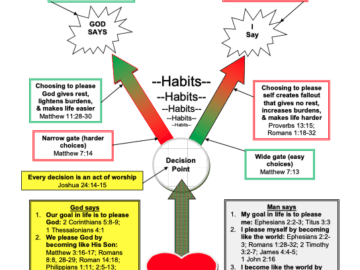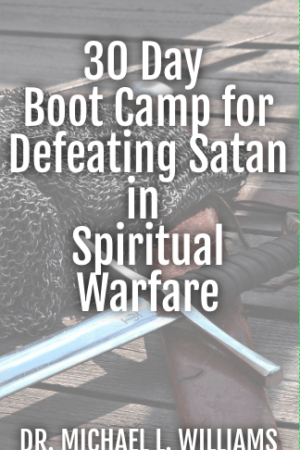How can we have bright futures without the burdens of our past?
Everyone that has been born has a past and a future. Likewise, everyone knows that how we live today can be impacted by things of our past. Unfortunately, the world typically embraces the teaching that the past is something we must learn to live with. However, the Bible teaches us that we can have a new life and bright future without having to live with the burdens of the past. How then can we have a bright future in life without constantly dealing with the burdens of our past?
How can our past influence our life today?
The first thing we must do to get an idea of how our past can influence our life today is look at things that happened in the past. When we look at the past, we can see patterns that impact us in different ways. We can see how things that are heard from others can affect our confidence. We can see how things that are experienced with others can affect our ability to trust. We can also see how things that are taught to us by others can affect our understanding.
For example, if someone experiences a constant barrage of criticism as a child, they may grow up to be afraid of confidently making and committing to decisions. If someone experiences being lied to or taken advantage of, they may be hesitant to trust anyone or have close personal relationships. Likewise, if someone is taught to think that their value and worth are based on their looks, they may adopt harmful diet practices out of an obsession to lose weight to look better.
All these things being said, knowing about a person’s past can be very beneficial for many reasons to understand how they think and act today. However, we must be careful not to fall into the trap of trying to psychoanalyze someone’s subconscious past as the key to them being delivered from any life issues today. Likewise, we must understand that we are not doomed to a dark future because of what we are dealing with today. So, how do we handle the past today to have a brighter future?
Handling the past Biblically
The first thing to understand is that the Bible teaches us how to handle our past and manage our future in ways that are different from what is commonly taught in the world today. This is because the Bible teaches us the truth about how the Holy Spirit can provide us with the mind of Christ. This mind of Christ gives us peace and enables us to handle our past with a Biblical mindset and the power of the Holy Spirit. This “mindset” is mentioned in the Old and New Testaments as follows:
Isaiah 26:3–4. “Thou wilt keep him in perfect peace, Whose mind is stayed on thee: Because he trusteth in thee. 4 Trust ye in the LORD for ever: For in the LORD JEHOVAH is everlasting strength:”
2 Thessalonians 2:1–2. “Now we beseech you, brethren, by the coming of our Lord Jesus Christ, and by our gathering together unto him, 2 That ye be not soon shaken in mind, or be troubled, neither by spirit, nor by word, nor by letter as from us, as that the day of Christ is at hand.”
Common false teachings about how the past affects us today
Unfortunately, many of the worldly teachings have even crept into Christian circles. Teachings such as how your past must be examined to explain who victimized you and are subconsciously repressing you from living a good life.
One common worldly teaching about guilt in our past is the idea that we must “forgive ourselves” so we can move on. The problem with this teaching is that it assumes guilt is based on our own human definition of right and wrong, and not God’s. This is a dangerous way to decide what is right and wrong and what makes it something to be guilty of. Even the worst monsters of humanity mentally assume that what they were doing was right and anyone that opposes them are wrong so forgiving themselves is not even an option.
There are those even in Christian circles that teach that bad memories of your past are caused by a demon and have to be “cast out” by a minister. Then when the memories cause problems again, they claim that demon returned, and needs cast out again. They totally ignore what the Bible teaches about how the Holy Spirit in a person is God and cannot be overpowered by any demon.
Finally, another one that is commonly taught how the “sins of your father” have put a curse upon you that you need to be delivered from. For more on this, read the article about Understanding what the Bible says about generational curses:
Despite all of these practices and approaches, the point we must focus on is if there are life issues from the past we are struggling with today. Then, is it something the Bible says is a problem and how should we deal with it Biblically? To simplify things, we must determine if what happened in the past was something that we did not handle right or was it because of something someone else did not handle right. From there we can move forward to remove any past barriers, which might prevent us from being the person God wants us to be today.
Determining how to handle something we did not do right
Often, we may suffer life issues because of something we did not do right. It could be sinning against someone else, or it could be not doing what we should have done. In either case, we are dealing with guilt. The important thing is that real guilt has a purpose: to hold us accountable to God’s standard of doing things. (Read also Exodus 20:7; Romans 1:16-32; Romans 3:5-23).
We must also keep in mind that guilt should be based on God’s standard and point us toward doing what Christ wants us to do. Desiring what Christ would want us to do also leads to a desire to make restitution or necessary changes (Read also Galatians 3:23-29; Romans 5:1-11).
How then should we resolve a guilty past? First, we should acknowledge our guilt. Second, we must confess it. Third, we must make things right so that the future is not hindered by our guilt. If we have done something in the past to someone that is at the root of our guilt, then we must be willing to make things right with them and ask for their forgiveness.
Likewise, we must not forget that we need to make things right with God too because not making things right with someone as we should, interferes with things being right between us and God (Read also Matthew 5:21-26; 1 John 1:2-2:2; James 5:16).
Should we apologize to those we sinned against?
Many people that try to make things right with someone will go to that person and apologize for what they did, thinking that apologizing makes things right. However, it is important to understand that an apology is not the same as asking for forgiveness. An apology does not address what we did that was wrong nor does it properly deal with the resolution of the offense. Asking for forgiveness, however does.
The word forgiveness has its root in the words “force” and “give” with the ending of –ness, which means “state of.” In other words, forgiveness is the action of “giving” up your right to execute justice by “force” (force-giving) so that the offender can be free of the penalty of their legal wrong. Therefore, when we ask for forgiveness, we must humble ourselves and confess our sin to them.
After we have confessed our sin, only then can we ask them to forgive us. When we do this, we have entered into a two-way transaction that brings about reconciliation. We humbly confess our guilt to the person and the person gives up their right to force justice upon us (Read also Romans 5:8-10; 2 Corinthians 5:17-21).
An apology on the other hand does not apply as it does not involve confessing sin and asking for forgiveness. The word apology is a combination of the prefix “apo,” which means “without” or “away from” and the root “logy.” Logy is a derivative of the Greek word logos meaning “the Word.” Together, apology means “without the Word.” Therefore, an apology is appropriate in a situation where the Word does not apply (Read also John 1:1, 14).
Logy is also seen used to mean the “study of” something but always infers a standard or truth. For example, the word theology means the study of (the truth of) God. Or, biology, means the study of (the truth of) life or way of living. An apology would communicate the idea that the situation would be addressed by studying it “apo” or without (the truth of) the Word because there was no Biblical legal offense.
Once forgiveness is asked and granted it is important to understand that the confession and forgiveness removes the sin from the relationship. Therefore, it cannot be used against the sinner in the future. It cannot be discussed with others. It cannot be dwelt upon. Likewise, forgiveness must be granted again when necessary if it happens again and is asked for (Read also Psalms 103:12; Hebrews 8:12; Hebrews 10:16-18; Matthew 18:21-22; Luke 17:3).
No matter what the case, if there is a failure to confess sin or a failure to forgive sins, then there is fallout from the situation that often results in loss of fellowship and a loss of blessing from God. However, if someone does not ask us for forgiveness, we are still called to let God deal with the issue and stand ready to forgive (Read also Matthew 18:15-35; 1 Corinthians 5:1-8; 2 Corinthians 6:11-18; James 5:16; 1 John 1:5-10; Psalms 103:12; Proverbs 10:12; Proverbs 17:9; Proverbs 28:13; Romans 12:14-21).
An exercise in understanding and practicing forgiveness
To get an idea of how these Biblical principles apply, consider the following situations and how to handle something that just happened. Then consider how you would handle them in light of what we have just learned.
Handling something that just happened
- Your car was in the shop getting repairs and you asked your friend if you could borrow their car to run to the grocery store. On your way, you are in a hurry, and you decide to try and beat a yellow light, but it turns red before you enter the intersection. At that very moment, Harry Hot Rod hits the gas the second he sees the green light on his side. As he enters the intersection you hit him. Once the dust settles it is determined that everyone is okay. Since you are driving your friend’s vehicle you now have to tell them about the situation. When considering the situation, what do you do when you talk to your friend? Are you guilty or not guilty?
- Your car was in the shop getting repairs and you asked your friend if you could borrow their car to run to the grocery store. On your way, you are in a hurry, and you decide you can make it through a yellow light, and hopefully it will stay yellow until after you clear the intersection. However, at the very moment your light turned yellow, Harry Hot Rod hits the gas despite his light still being red. As he enters the intersection you hit him. Once the dust settles it is determined that everyone is okay. Since you are driving your friend’s vehicle you now have to tell them about the situation. What do you do? Are you guilty or not guilty?
What have we learned from these situations?
- We are guilty! In Situation 1, you borrowed your friend’s vehicle and drove through a red light and were involved in an accident. The appropriate thing to do would be to humble yourself and confess your sin to your friend and Harry Hot Rod. You broke the law and damaged your friend’s vehicle as well as Harry’s vehicle, which was wrong. Only after confessing your sin could you ask them to forgive you or give up their right to force justice upon you. Once forgiven, the two-part transaction makes things right between all parties. However, you will still be legally liable for damages.
- We are not Guilty! In Situation 2, you borrowed your friend’s vehicle and someone else ran the red light and hit you. Although you were driving your friend’s vehicle, you were not Biblically at fault, so asking for forgiveness is not needed. In this case, an apology would be appropriate because the Word does not apply. The person at fault needs to humble themselves and ask for forgiveness. However, you were involved in the accident and should want to do all you can to restore your friend’s vehicle, not because you were at fault, but because you should want to make your friend whole again.
Handling forgiveness for something in the past
Often people may suffer life issues from things after forgiveness has been asked and received in the past. Or it may be from things that have happened at the hands of others. In both situations, God provides a direction forward. Consider the following situations:
Fallout from a past that was resolved by confession and forgiveness.
God has not called us to wallow in sadness, unworthiness, or anger resulting from past sin that has been confessed. When we do this, then we are not able to use our lives in service to the Lord because we are in bondage to illegitimate or false guilt. Instead, we must ask ourselves why we might be unable to get beyond the past. It might be that we went through the motions of asking for forgiveness, but really did not forsake the sin or repent out of a godly sorrow (Read also Proverbs 28:13; Acts 26:19-20; 2 Corinthians 7:8-11).
It might be because of pride that belittles what we did as being no big deal. Or maybe it is that we do not really believe in God’s promises of forgiveness. Often this might be the case in that we really do not believe we can be forgiven (Read also 1 Corinthians 10:12; Proverbs 16:18;1 John 1:9; Psalms 103:8-14).
In any case, if forgiveness has been genuinely asked, we must rejoice in the Lord’s forgiveness. We must also search for what good can come out of the lessons of the past, Finally, we must move on with life and serving the Lord (Read also Psalms 103:12; 1 Timothy 1:12-13; Philippians 4:4-5; Philippians 3:13-15).
We must also thoughtfully consider that our motivation for moving on should be based on the fact that God loves us and any thoughts that interfere with us drawing closer to Him and not serving Him are not pleasing to Him. This is because we are taught that we should love God first and our neighbor as ourselves. Any thoughts otherwise only please Satan and not God (Read also Mark 12:28-34).
Fallout from a past that was a result of bad memories not because of my own sin
Sometimes we may encounter people that are victims of abuse, assault, or any number of situations where someone committed some act of sin against them personally. Sometimes it may even be a time when someone has been persecuted for their faith or has gone through some personal trial (Read also Romans 10:13-17; Hebrews 11).
In these cases, it is important not to seek revenge. This does not mean that if a crime took place, we should not report it. In fact, that is why God ordained government officials to handle these issues. As mentioned before, we should seek what good can come out of these experiences of the past (Read also Romans 13)
Some of the most effective counsel is when someone uses their experiences that involved God and His Word that helped them to help others that might be struggling with similar issues to do the same. Likewise, they should help the person dealing with life issues resulting from the past to learn how to spend time in the Word and in worship: remembering that it is God that is on the throne. He will do great things to heal us and give us peace (Read also Genesis 50:19-20; Psalms 34:13-22; Psalms 35:27; Nehemiah 8:6-10; Romans 12:9-20; Philippians 2:12-18; 1 Peter 2:17-25).
Handling sin in the local church
One of the most troubling problems we see in many local churches is that they do not address sin that is taking place in the congregation. In many cases, it may even involve the church leadership. Likewise, it may often involve those in the church engaged in affairs, sexual immorality, and even involvement with drug and alcohol abuse. Yet, there is little if any church discipline in the local church. Therefore, it is important that issues such as these and others be addressed Biblically (Read also 1 Corinthians 5:1-13).
Unfortunately, many local church leaders do not want to address sin-based issues because they are afraid of offending people. Yet, the very activities they are afraid to address are the very same issues that drive away many people and ruin the lives of others that stay. However, it is not understood that unresolved sin or mishandled conflict is in and of itself also sin (Read also Psalms 119:165).
Thankfully, God gave us instructions for local church discipline or addressing issues of unrepentant sin that proliferates in the local church so that the flock is protected (Read also Acts 20:27-3). We see the instructions for this as follows:
Matthew 18:15-20. “Moreover if thy brother shall trespass against thee, go and tell him his fault between thee and him alone: if he shall hear thee, thou hast gained thy brother. (16) But if he will not hear thee, then take with thee one or two more,
that in the mouth of two or three witnesses every word may be established. (17) And if he shall neglect to hear them, tell it unto the church: but if he neglect to hear the church, let him be unto thee as an heathen man and a publican. (18) Verily I say unto you, Whatsoever ye shall bind on earth shall be bound in heaven: and whatsoever ye shall loose on earth shall be loosed in heaven. (19) Again I say unto you, That if two of you shall agree on earth as touching any thing that they shall ask, it shall be done for them of my Father which is in heaven. (20) For where two or three are gathered together in my name, there am I in the midst of them.”
Important points to consider when addressing sin in the local church:
1. Matthew 18:15. Approach one-on-one alone:
- When there is an issue between two believers, the one “offended” should first consider if love can cover it (Read also Proverbs 10:12; 1 Peter 4:7-10)
- If not, then they should approach the other in a spirit of meekness and with the intent of reconciliation. He or she should also consider if they contributed to the problem. (Read also Galatians 6:1-3)
- Likewise, they should consider if it is their place to be involved. If someone is not part of the problem or part of the solution, then sharing information with uninvolved parties is gossip so approach the other person one-on-one alone
- Consider what might be the root cause so that resolution and reconciliation can be achieved (Read also 1 John 2:15-16)
- Has the issue been resolved if it involves others? Did the person repent and confess their sin?
- If unsuccessful go to the next step
2. Matthew 18:16. Re-approach with one or two others
- Only done if first level approach does not work
- Approach with one or two other impartial believers alone to confirm what is said and to avoid gossip
- Biblically consider as a group what might be the root cause so that Godly resolution and reconciliation can be achieved (Read also 1 John 2:15-16)
- If unsuccessful go to the next step
3. Matthew 18:17-20. Approach with the local body of believers
- Only done when second level approach does not work
- Take the matter to the church: preferably the church leadership
- Only then may the unresolved matter be discussed as a body
- Handle in a Christ-like manner so as to not inflame rebellion or reactionary sin. We should never use church discipline as a hammer, but as a loving plea for
repentance and reconciliation. If unsuccessful, weeping should be the result, not fighting and arguing - If not resolved at this final level, treat as heathen and publican (unbeliever) (Read also Romans 16:17-18; 2 John 1:9-11)
4. If resolved on any level, do not bring the issue up again
Psalm 103:8–17. “The LORD is merciful and gracious, Slow to anger, and plenteous in mercy. 9 He will not always chide: Neither will he keep his anger for ever. 10 He hath not dealt with us after our sins; Nor rewarded us according to our iniquities. 11 For as the heaven is high above the earth, So great is his mercy toward them that fear him. 12 As far as the east is from the west, So far hath he removed our transgressions from us. 13 Like as a father pitieth his children, So the LORD pitieth them that fear him. 14 For he knoweth our frame; He remembereth that we are dust. 15 As for man, his days are as grass: As a flower of the field, so he flourisheth. 16 For the wind passeth over it, and it is gone; And the place thereof shall know it no more. 17 But the mercy of the LORD is from everlasting to everlasting upon them that fear him, And his righteousness unto children’s children;”
Final Thoughts
Considering what we just learned, the process of handling the past Biblically applies the same way, no matter if it is the result of our own sin or the sin of another. The goal should be reconciliation and restoration. In the case of the sinner, the goal is to see them fully restored and serving the Lord, even if it is in another capacity. Likewise, while reconciliation and restoration with an offending party may not always be feasible, any person that is suffering should be loved and supported while being helped to regain their strength and composure in the Lord.
Finally, when it comes to stepping out from the past and establishing a new future, what we do today becomes the past of tomorrow. Therefore, we must look at today as a day that we can have a new future because we are new creatures in Jesus Christ: old things are passed away and we can behold all things that become new as part of our bright new life and future. At the same time, others will see HIs brightness shining in us and want to learn how they can be blessed in the same way, which will open up new opportunities to shine for Him.
2 Corinthians 5:17–20. “Therefore if any man be in Christ, he is a new creature: old things are passed away; behold, all things are become new. 18 And all things are of God, who hath reconciled us to himself by Jesus Christ, and hath given to us the ministry of reconciliation; 19 To wit, that God was in Christ, reconciling the world unto himself, not imputing their trespasses unto them; and hath committed unto us the word of reconciliation. 20 Now then we are ambassadors for Christ, as though God did beseech you by us: we pray you in Christ’s stead, be ye reconciled to God.”
Thanks be to God for our bright and amazing future to come. May God bless us in this endeavor.

Dr. Michael L. Williams, Head of Ministry Operations and Technology at Christianity Every Day, is a Christ-centered Author, Educator, Biblical Counselor and Advisor. He is ordained in Pastoral Ministry and formerly the founding Pastor of Selah Mountain Ministries, a church started along with his wife, Pamela Rose, after several years of pastoral experience and training in Biblical Counseling. Selah Mountain provided Biblical counseling and education to the public on how to overcome life issues Biblically on topics such as anger management, marriage, addictions, and other subjects – often referred to as mental illnesses. To learn more about Dr. Mike visit the About page.






















